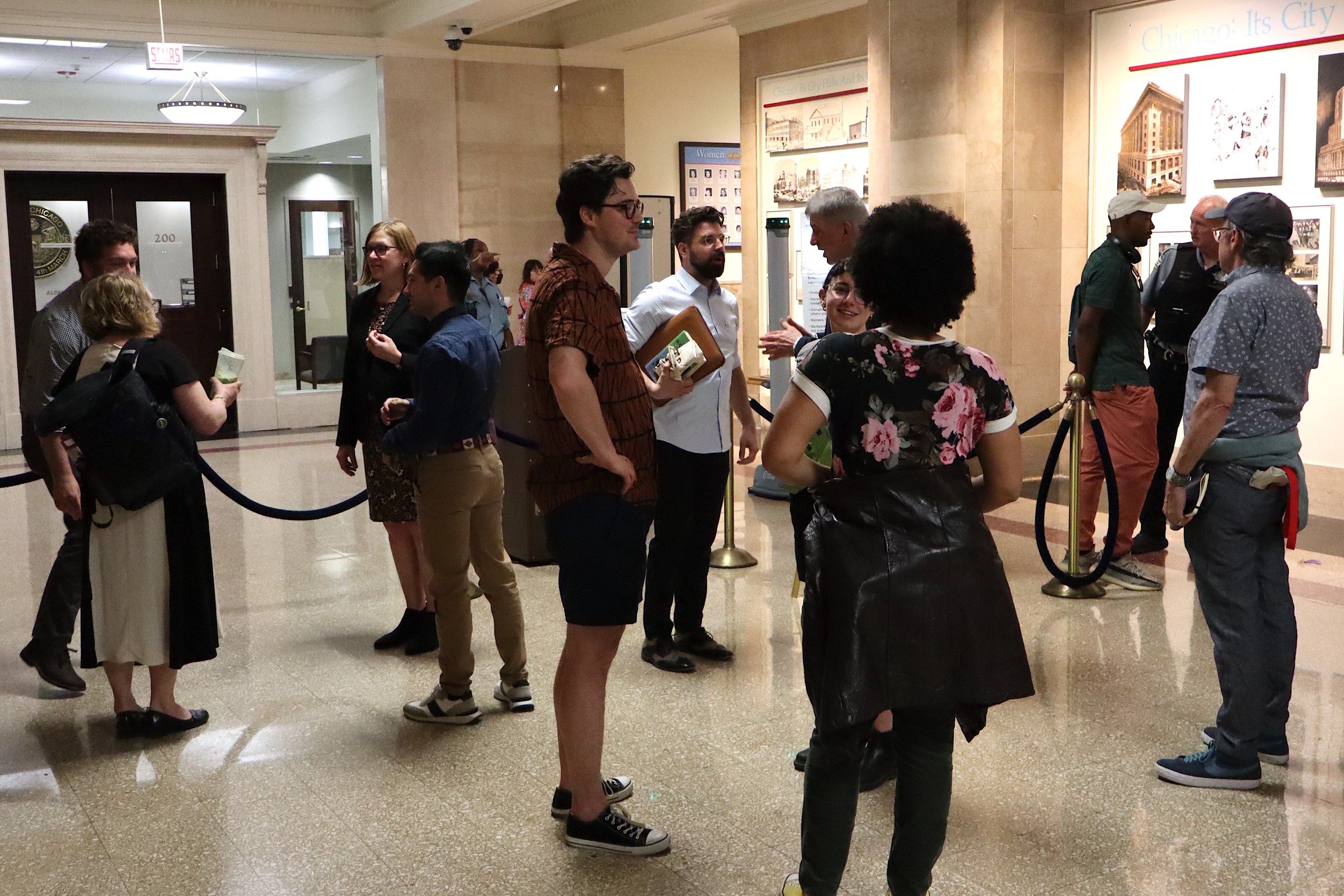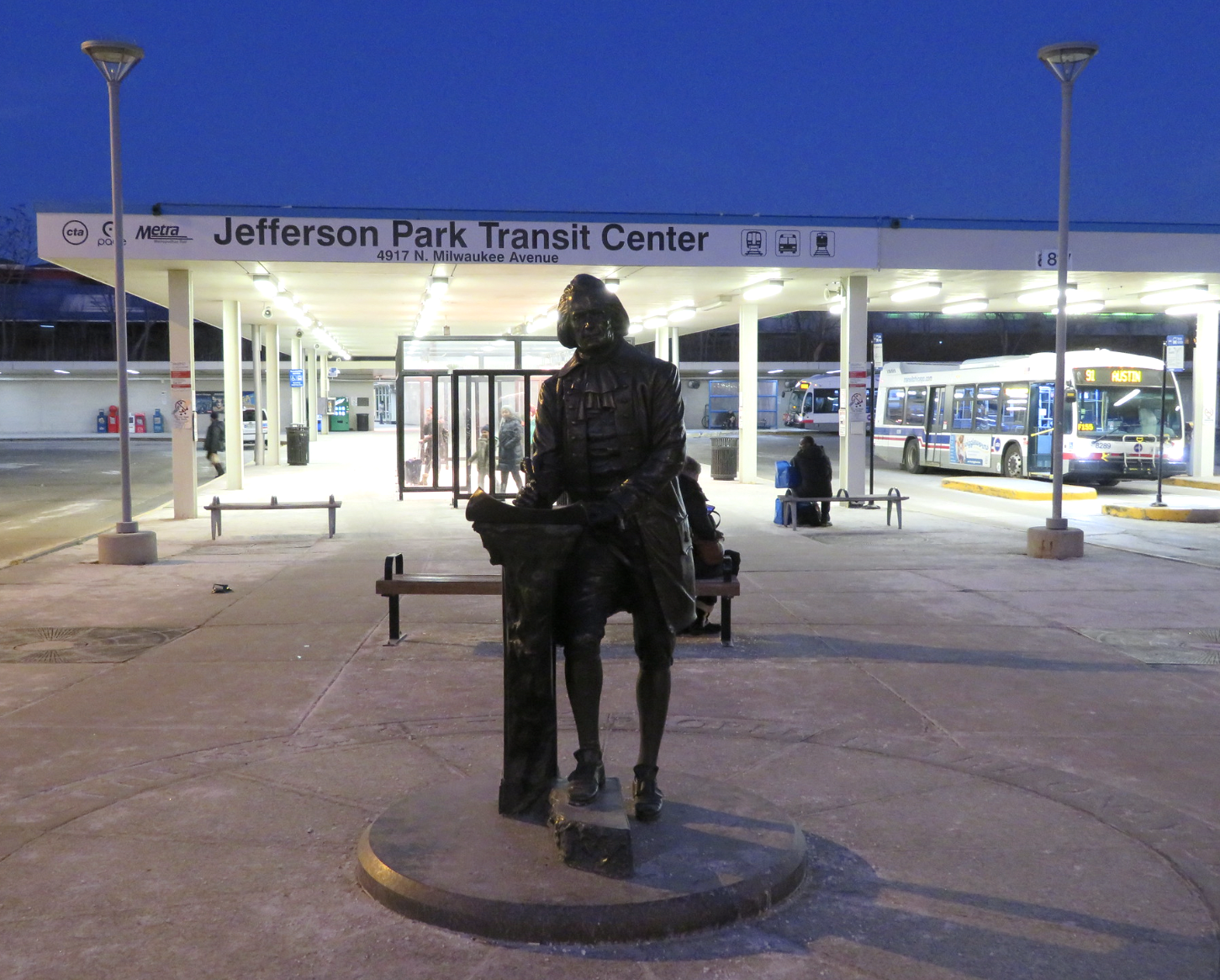Riding Through the Pain: One Year, One Day, and One Hundred Miles of Biking
4:12 PM CDT on August 21, 2019
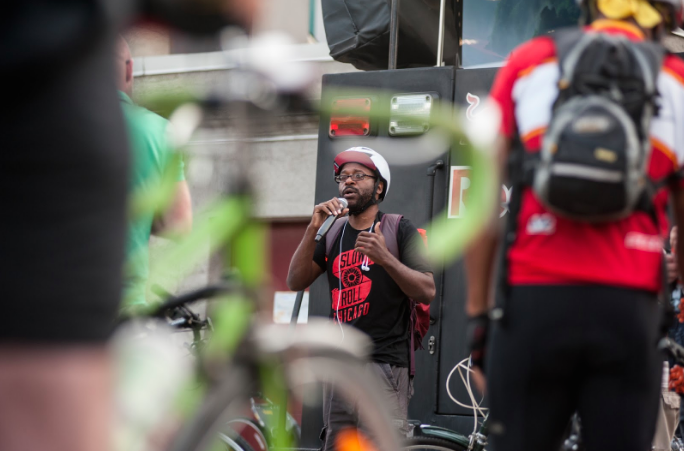
Olatunji Oboi Reed kicking off a Slow Roll Chicago ride in the Marquette Park neighborhood on the Southwest side of Chicago in August of 2015. Photo: Michael Bracey
Oboi Reed is cofounder of Slow Roll Chicago, an organization that promotes cycling on the city's South and West sides, and founder and CEO of the Chicago-based mobility justice nonprofit Equiticity.
On Monday, June 18, 2018, I arrived back home (by way of cultural adoption) to Salvador, Bahia, Brazil. I was finally home, six years after I last visited. However, this time I was severely depressed.
The journey back to Brazil was long, stressful, and exhausting. Several months before arriving in Salvador, I founded the Equiticity racial equity movement. In short order, we established for the organization a National Board of Directors and a Chicago Advisory Council; initiated work on our Mobility Justice in Chicago Research Study; developed the concept and partnerships for a bicycle library; and launched three advocacy campaigns (cancellation of the Active Transportation Alliance’s Vision Zero Summit, removal of police enforcement from Vision Zero Chicago, and integration of racial equity into the Chicago Metropolitan Agency for Planning’s On To 2050 plan). During all of this, I also embarked on an ambitious, global speaking tour, entitled The 2018 Equity Power Trip.
As part of the speaking tour, I was invited to co-present during the opening plenary of the European Cyclists Federation’s Velo-City 2018 conference in Rio de Janeiro. Getting to Brazil felt like I was crawling to the finish line of a grueling marathon.
In the months leading up to my travels in Brazil, I was feeling stressed out, anxious, and exhausted. I was overextended and unable to do things I knew would keep me mentally and emotionally healthy - cycling, yoga, meditation, and connecting with family and friends.
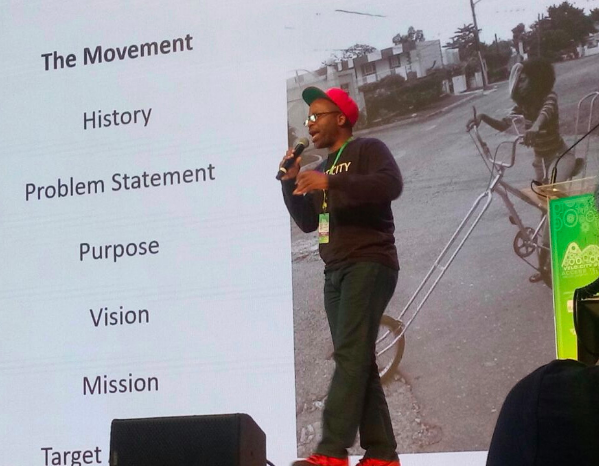
In hindsight I realize that, with every passing week, I was sinking deeper into depression. I tried to push through. I love this work and I’m deeply interested in improving the condition of our neighborhoods. For these reasons, I continued pushing forward, ignoring the severity of the pain. Pushing through was a mistake, causing me to sink deeper and deeper into depression.
I made it to Brazil, barely, receiving my Brazilian visa a couple of days before my flight. Upon arriving in Rio de Janeiro, I co-presented during the opening plenary at the Velo-City conference.
Following the weeklong conference, I traveled home to Salvador, Bahia, for an extended vacation and to decompress and recharge. Unfortunately, that's not what happened. When I crossed the threshold of my friend’s home, I crashed. My entire time in Salvador, I was severely depressed and unable to enjoy all that home has to offer. Three weeks later, I was on a flight coming back to Chicago, not feeling any better. In fact, I was feeling worse, anticipating what was waiting on me stateside.
The journey from Brazil back to Chicago was even longer, more stressful, and debilitatingly exhausting. I came home to a full inbox of emails, voicemails, and to-do items. I was only days away from more travel, this time stretching over the next few months. Since I was already severely depressed, the idea of pushing through my depression to follow though with my obligations seemed akin to moving mountains.
The world turned dark and cold. I was done. I shut down, for a year.
My abrupt, extended absence from Equiticity, Slow Roll Chicago, and the work caused a huge disruption. Equiticity was off to a great start and had built up significant momentum. Then, it all came to a screeching halt. Our research and advocacy work quickly paused. Our germinating programs paused. Our collective, shared vision was without leadership. I knew it clearly and it pained me.
Slow Roll Chicago was undergoing a leadership transition. We were in the midst of organizing our 2018 ride season. My absence hindered our bicycle movement at a critical time and it pained me.
I felt further crushed by the weight of guilt, sadness, and despair. This only made matters worse. I was confused and unable to pull myself out of the darkness.
What hurt the most was my absence in the lives of my family. I was unable to be there for my beautiful, loving mother, who is struggling with her own health challenges. I was unable to maintain a relationship with my grandfather, my only living grandparent and soon turning 95.
Especially painful was my absence in the lives of my two year old niece Layla Grace and my 5-year-old twin nephews Ajani and Noah. One day while riding in the car with my brother Khari and my nephews, Ajani told me he cried because he hadn’t seen me in such a long time. Another time, a family friend told me that my nephews cried when I missed their fourth birthday party. I felt a pain words are incapable of describing.
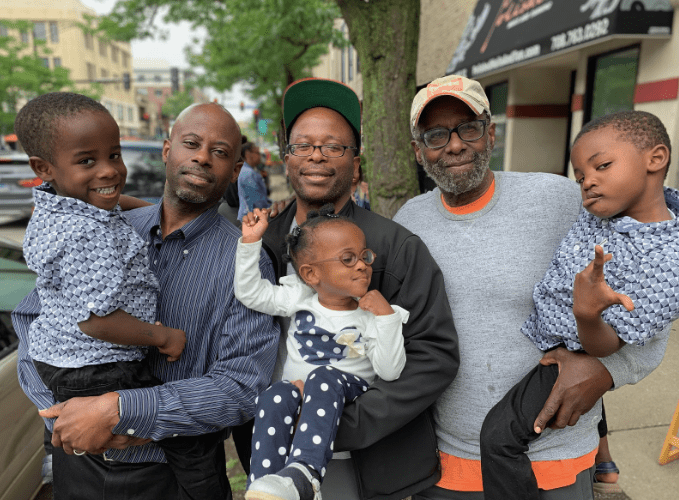
I’ve long known that racial inequities were accelerating in Chicago under former Mayor Rahm Emanuel. I was fully aware of the systemic change we were working to bring forth required new leadership in our city. My personal choice for mayor of our beautiful city was my brother, former CPS principal Troy LaRaviere, or my sister, Austin chamber of Commerce director Amara Enyia. I love both of them and deeply believed in their potential to operationalize racial equity at City Hall. However, my depression and the resulting darkness did not allow me to actively support their mayoral campaigns. At this critical time in the city I love, I felt more guilt and more pain.
After about a year, my brother Khari and my family helped me to begin my ascent out of depression. Earlier this summer, I spend six weeks living at Khari’s home helping his family while their au pair was on vacation and during a series of eye surgeries my brother underwent. Practically everyday, my nephews woke up by about 6:30am and the first thing they did was come to my room and launch themselves onto my bed, joyfully not concerned with whether I was asleep or not. They wanted to spend time with me and I gladly obliged, taking them on many excursions during my time there.
My time with Khari and his family gave me a much needed spark. I was starting to climb out of the crippling depression and feeling much better. I was ready to accept medical help. Khari referred me to the psychiatry department at University of Illinois Health.
A few days after leaving Khari’s home and returning back to my place, I started doing the things I love and that I know will help me stay healthy. I started riding my bike again on the lakefront. I started practicing yoga and meditation again. I slowly started to reconnect with family and friends.
For nearly ten years, cycling has been an important part of my healing regimen. The more I ride the better I feel. This time was no different. I started riding more and more, further and further. I set a goal to complete a century ride (100 miles) by the end of the summer. It represented for me an important psychological milestone in my return to the work.
On Sunday, August 4, I participated in the Two Rivers Century Ride in Kankakee County, Illinois. Upon arriving at the ride a kind brother by the name of Dr. Kevin Lyles kindly allowed me to ride with him after I spotted his Major Taylor Cycling Club of Chicago jersey and asked if I could join him. Throughout the ride, Kevin inspired me. He is a political science professor at the University of Illinois at Chicago, doing important research on the Black political and civil rights experiences. He is a bit older than myself and has overcome some physical health challenges. He was only about a year into endurance cycling.
We enjoyed a great conversation over the course of about seven hours, discussing our love for cycling, respective work, families and life goals. A few times, Kevin asked why I decided to complete a century ride for the first time without completing the necessary training to prepare for it. I was not ready to tell Kevin the truth of my life over the past year. The ride represented for me an important personal milestone, marking my return to the work, my family, and my friends.
Kevin “pulled” me for 101 miles, letting me ride closely behind him so that he blocked the wind for me and I didn't have to work as hard. When my body and mind stopped short of our collective goal of completing 126 miles together, he encouraged me and congratulated me for making it that far. Kevin pushed through, finishing the ride by himself. I was deeply moved and inspired.
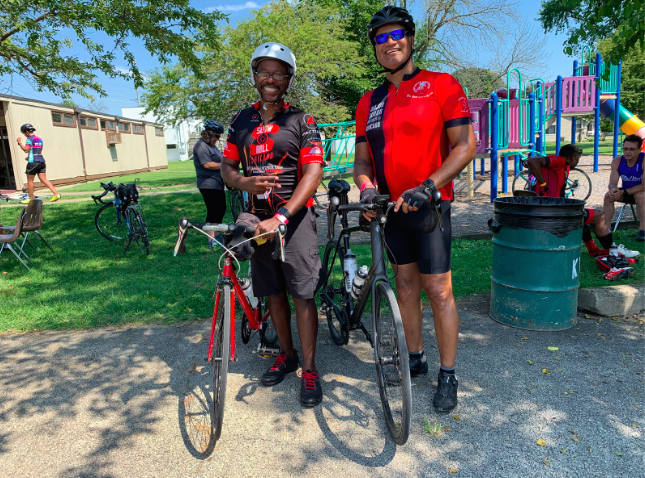
The century ride was another spark. I am now slowly reintegrating myself back into the work of Equiticity. I am excited to again do the work I love -- advancing racial justice and increasing mobility and opportunity for Black and Brown people. These are my passions, my life’s work.
I am fortunate that Equiticity was surrounded by fiercely supportive people on all sides, who protected our racial equity movement during the precarious, turbulent period of my yearlong absence. When I was ready to walk back into the work of Equiticity, I was pleasantly surprised to find that, despite the serious setbacks and my lack of leadership during the past year, this nascent organization was largely intact.
I want to share a huge thank you to the Equiticity’s National Board of Directors and Chicago Advisory Council for never giving up on me and our vision. I want to share a special thank you to our treasurer Ms. Jacky Grimshaw for her tireless work this past year to keep our Mobility Justice in Chicago Research Study alive. I also want to thank our research team Kate Lowe, Tiffany Ford, Jesus Barajas, Audrey Wennink, Jeremy Glover, and Ronnie Matthew Harris. They all pushed forward with our research study in uncertain and uncomfortable times. Thank you as well to my advisors Ms. Deborah Harrington and Creighton Randall.
I dearly appreciate continued support of our funders The Chicago Community Trust and Crossroads Fund. I also appreciate all our partners, including Metropolitan Planning Council and the workforce centers and community-based organizations involved with our MJC research study. A warm, heartfelt thank you to our fiscal agent Black United Fund of Illinois, Inc., as well as executive director Ms. Carolyn Day and program manager Ms. Iris Dunmore, for nearly two years of sustained, committed partnership. A huge thanks to all of the people who continue to support our movement in both big and small ways, through volunteering, donating, and otherwise protecting what we have built.
I also want to share my appreciation for my Slow Roll Chicago colleagues co-founder Jamal Julien, and ride season managers Dan Black and Melanie Moore. And, thank you to my extended family and friends around the world for staying by my side even when I rejected your overtures.
Lastly, I love the national conversation taking place around mental health in the Black community. I am grateful for people with a high profile platform centering this much needed conversation, helping to normalize mental illness and remove the stigma in our communities. Thank you to Charlamagne tha God, Kanye West, Taraji P. Henson, Brandon Marshall, and the many others.
I continue to ride through the pain because I love myself, my family, my community, my people, our work, our city, and our planet. But after coming out the other side of this difficult year, I now understand that my own healing must be my first priority.
Stay in touch
Sign up for our free newsletter
More from Streetsblog Chicago
Which Metra corridor would become more bike-friendly and greener under a new plan? Ravenswood!
Thanks to plans to convert little-used parking spaces, the avenue is slated to get a new bike lane, and the Winnslie Parkway path and garden will be extended south.
They can drive 25: At committee meeting residents, panelist support lowering Chicago’s default speed limit
While there's no ordinance yet, the next steps are to draft one, take a committee vote and, if it passes, put it before the full City Council.
One agency to rule them all: Advocates are cautiously optimistic about proposed bill to combine the 4 Chicago area transit bureaus
The Active Transportation Alliance, Commuters Take Action, and Equiticity weigh in on the proposed legislation.


